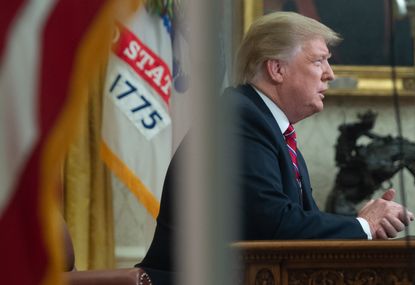Trump's imaginary border crisis
There is no national security crisis on the southern border — and everyone in Washington knows it


Let's get one thing perfectly clear: There is no national security crisis on the southern border.
President Trump claimed otherwise in his nine-minute Oval Office address to the nation on Tuesday night. But he was lying.
How do we know this? Because if there were a genuine national security crisis on the southern border, Republicans in the House and Senate would be tripping over themselves to fund — and take credit for funding — Trump's border wall. There is no political downside whatsoever to taking a strong stand in defense of the country in the midst of a national security crisis.
Subscribe to The Week
Escape your echo chamber. Get the facts behind the news, plus analysis from multiple perspectives.

Sign up for The Week's Free Newsletters
From our morning news briefing to a weekly Good News Newsletter, get the best of The Week delivered directly to your inbox.
From our morning news briefing to a weekly Good News Newsletter, get the best of The Week delivered directly to your inbox.
And yet, what have we seen over the past two years during which Republicans controlled both houses of Congress and could have appropriated funds for Trump's beloved wall at any time? Zip. Nada. Nothing.
Part of the reason is that Trump's talk of the wall on the campaign trail was always wrapped up with the patently preposterous claim that Mexico would pay for it. That stuck in the craw of some fiscally prudent Republicans. (Yes, there are still a small handful of those around.) But if the threat were real — if the evidence of it were obvious, or even vaguely plausible — even the stingiest members of the GOP would gladly have added a few more inches onto the Everest of national debt in return for looking tough and patriotic. We would have gotten wall funding in the opening months of the Trump administration. Hell, in the face of a genuine national security crisis, the vast majority of Democrats would be eager to share credit for keeping the country safe, even with Trump in the White House.
But none of that has happened. Not before the failure to repeal ObamaCare, and not after. Not before passage of the massive corporate tax cut, and not after. Not in the run-up to the midterm elections, and not after.
Because there is no national security crisis on the southern border — and everyone in Washington knows it.
And to the extent that there is a humanitarian crisis there, which the president also asserted in his speech, it's almost entirely the creation of the Trump administration itself, whether through ineptitude or malice. (With this president and his team, it is usually both.)
So here we are — roughly a week into a new Congress with Democrats in control of the House, two-and-a-half weeks into a government shutdown with no end in sight, and the president has delivered a prime speech to the country, declaring the urgent need to fund his boondoggle of a solution to a problem that's partly fiction and partly a mess for which he's directly responsible.
Welcome to the surreal absurdity of American politics in 2019.
Since my sweeping dismissal of the president's case is bound to raise hackles on the Trump-loving right, let me lay my cards on the table: I do not support open borders. I consider any public figure or pundit who does to be profoundly unserious at the levels of both practical politics and philosophical reflection on the nature of human society. I favor relatively high levels of legal immigration but also think it's perfectly legitimate for a country to lower those levels in response to public opinion.
If there were a true shift in public sentiment against immigration — which, believe me, there would be if there were a genuine national security crisis on the southern border — I would consider it acceptable for the president to respond to that shift, making it more difficult for migrants to enter the country, maybe even with the strengthening and expanding of physical barriers in some places.
But that is not at all what is happening. On the contrary, public opinion has shifted in favor of immigration since the president was elected, no doubt in large part because of the above-mentioned ineptitude and malice the administration has displayed toward immigrants over the past two years. That has, if anything, put the cause of immigration restrictionism in a weaker position politically than it was when he was running for president.
Like King Midas in reverse, every policy Trump touches turns to excrement.
And so, in place of prudent and measured proposals for how to solve a real problem, on Tuesday night we got demagogic fearmongering, a barrage of misleading statistics, and the usual panoply of cherry-picked, nightmarish stories of sinister foreigners routinely slaughtering our poor, defenseless neighbors — all as a way of making Trump's wall sound like salvation from our drug-riddled, gang-infested hellscape of a country.
When he was running for president, Trump inspired widespread eye-rolling when he declared, after denouncing in cartoonishly exaggerated terms the "disaster" of life in the early 21st-century United States, "I alone can fix it." Two years into the Trump presidency, I am tentatively prepared to concede that he may well have had a (limited) point.
When the problem is a crisis that doesn't even exist, maybe insisting on a pointless, nonsensical solution is a perfectly fitting response.
Sign up for Today's Best Articles in your inbox
A free daily email with the biggest news stories of the day – and the best features from TheWeek.com
Damon Linker is a senior correspondent at TheWeek.com. He is also a former contributing editor at The New Republic and the author of The Theocons and The Religious Test.
-
 Meet Youngmi Mayer, the renegade comedian whose frank new memoir is a blitzkrieg to the genre
Meet Youngmi Mayer, the renegade comedian whose frank new memoir is a blitzkrieg to the genreThe Week Recommends 'I'm Laughing Because I'm Crying' details a biracial life on the margins, with humor as salving grace
By Scott Hocker, The Week US Published
-
 Will Trump fire Fed chair Jerome Powell?
Will Trump fire Fed chair Jerome Powell?Today's Big Question An 'unprecedented legal battle' could decide the economy's future
By Joel Mathis, The Week US Published
-
 Sri Lanka's new Marxist leader wins huge majority
Sri Lanka's new Marxist leader wins huge majoritySpeed Read The left-leaning coalition of newly elected Sri Lankan President Anura Kumara Dissanayake won 159 of the legislature's 225 seats
By Peter Weber, The Week US Published
-
 US election: who the billionaires are backing
US election: who the billionaires are backingThe Explainer More have endorsed Kamala Harris than Donald Trump, but among the 'ultra-rich' the split is more even
By Harriet Marsden, The Week UK Published
-
 US election: where things stand with one week to go
US election: where things stand with one week to goThe Explainer Harris' lead in the polls has been narrowing in Trump's favour, but her campaign remains 'cautiously optimistic'
By Harriet Marsden, The Week UK Published
-
 Is Trump okay?
Is Trump okay?Today's Big Question Former president's mental fitness and alleged cognitive decline firmly back in the spotlight after 'bizarre' town hall event
By Harriet Marsden, The Week UK Published
-
 The life and times of Kamala Harris
The life and times of Kamala HarrisThe Explainer The vice-president is narrowly leading the race to become the next US president. How did she get to where she is now?
By The Week UK Published
-
 Will 'weirdly civil' VP debate move dial in US election?
Will 'weirdly civil' VP debate move dial in US election?Today's Big Question 'Diametrically opposed' candidates showed 'a lot of commonality' on some issues, but offered competing visions for America's future and democracy
By Harriet Marsden, The Week UK Published
-
 1 of 6 'Trump Train' drivers liable in Biden bus blockade
1 of 6 'Trump Train' drivers liable in Biden bus blockadeSpeed Read Only one of the accused was found liable in the case concerning the deliberate slowing of a 2020 Biden campaign bus
By Peter Weber, The Week US Published
-
 How could J.D. Vance impact the special relationship?
How could J.D. Vance impact the special relationship?Today's Big Question Trump's hawkish pick for VP said UK is the first 'truly Islamist country' with a nuclear weapon
By Harriet Marsden, The Week UK Published
-
 Biden, Trump urge calm after assassination attempt
Biden, Trump urge calm after assassination attemptSpeed Reads A 20-year-old gunman grazed Trump's ear and fatally shot a rally attendee on Saturday
By Peter Weber, The Week US Published